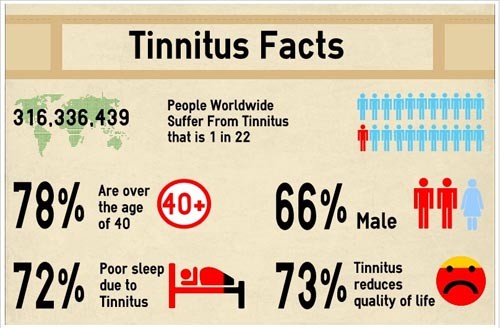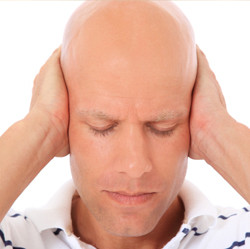Imagine having a ringing in your ear that just won’t go away. Sometimes it’s a whistle that is barely audible. Other times it can be so loud that you have trouble hearing anything else. It could also be what most people describe it as “ringing in the ear”. It will appear in one ear one day and the other the next. If you are suffering from these symptoms, there is a good chance that you have tinnitus. Today more than 10% of Americans are currently suffering with tinnitus.

Tinnitus can only be diagnosed by a professional, though if you have a ringing in your ear that lasts more than a few days, comes back often and seems to be worsening over time; it is a safe assumption that it could be the cause. There are treatments for this health issue and ways to cope with the discomfort. In order to better understand what is happening to you, you will need to learn more about the problem.
What Are The Causes Of Tinnitus
 An important fact about tinnitus is that it is not a disease itself but a symptom of one. Because it involves one’s perception of sound, it can be a sign of a problem with the ear or even the brain. There are many causes of tinnitus and your doctor will be able to test for and check which one of these causes could be bringing it on.
An important fact about tinnitus is that it is not a disease itself but a symptom of one. Because it involves one’s perception of sound, it can be a sign of a problem with the ear or even the brain. There are many causes of tinnitus and your doctor will be able to test for and check which one of these causes could be bringing it on.
- Hearing loss in the elderly
- Exposure to loud noises over a prolonged period of time
- Ear and sinus infections
- Heart or blood vessel problems near the ear drums
- Meniere’s disease
- Brain tumors
- Hormonal changes in women and sometimes men
- Thyroid problems
- Certain medicines and negative side effects
These are a few of the more common causes of tinnitus. As you can see, there are quite a few that are very unrelated. This is why it is almost impossible to diagnose what is causing this problem without the help of a professional. But the good news is Tinnitus usually isn’t anything serious.
How To Treat Tinnitus
If your doctor is able to find the problem causing the tinnitus, that issue can be addressed. For example, if your thyroid is causing these annoying sounds to manifest themselves, it can be treated with the right medication. Once your thyroid gland is healthy, the tinnitus should subside.
On the off-chance that the root problem is untreatable or your health care provider is unable to find the cause, there are certain treatments that can help you deal with the tinnitus itself.
- Alternative treatments – Many people have found that meditation is a great help when it comes to reducing the symptoms of tinnitus. This practice can be very difficult to master and will take time to work.
- Amplification (hearing aids) – If the tinnitus is due to some type of hearing loss because of old age or exposure, a hearing aid may be all that is needed to remedy the situation.
- Cochlear implants – These implants are designed for those who are partially deaf. Essentially this would have the same effect as a hearing aid but for more serious cases.
- Cognitive therapy – This is a type of psychotherapy that would help you control the negative thoughts that occur from the frustration of dealing with tinnitus.
- Drug therapy – Certain medications can be prescribed to help eliminate the sounds. This is especially true if the issue is being caused by an external source near the eardrum.
- Tinnitus retraining therapy (T.R.T.) – This is another form of psychotherapy in which the patient is trained, or retrained, to change their perception of the tinnitus sound. The goal is to take away any negative feelings of and reactions to the tinnitus.
- TMJ treatment – If the tinnitus is being caused by joint pain in the jaw, there are several treatments that can help ease that pain and therefore lessen or completely end the audible issues.
Although this may be an extremely difficult problem to deal with, there are many ways to either cure or manage the discomfort you are suffering through due to tinnitus. The first step to relief is to seek medical attention. Your doctor will be able to guide you to the right tinnitus treatment.
